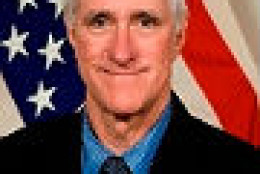Defense Department
-
The pace of new Ebola infections appears to have leveled off, but its too early declare victory. A lot of work is going on behind the scenes, on the research front. Army scientists are working on a vaccine for Ebola. With troops being deployed to West Africa to help control and treat the outbreak, Army scientists are taking the most advanced vaccines forward as quickly as possible. Dr. John Dye is the viral immunology branch chief at the U.S. Army Medical Research Institute of Infectious Diseases. He tells Tom Temin on the Federal Drive that for the Army, research into infectious diseases has a long history.
November 17, 2014 -
Leaders at the Department of Veterans Affairs just found out that independent auditors have given their IT security program a failing grade for the 16th year in a row. Federal News Radio DoD Reporter Jared Serbu has details on the security shortcomings and what VA says it's doing to fix them.
November 14, 2014 -
The National Geospatial Intelligence Agency is helping with Ebola civilian relief efforts in Africa. The agency launches a new public website featuring maps showing power grids, roads and other infrastructure that might be useful to civilian workers. Tools will let users pinpoint Ebola cases by location. Tim Peplaw is director of NGA's Readiness, Response and Recovery group. Peplaw points out to Tom Temin on the Federal Drive that for the NGA, support for humanitarian causes is nothing new.
November 13, 2014 -
The Army Corps of Engineers' strategy for building more resilient civil works infrastructure involves planning for more unpredictable weather events, and treating watersheds as integrated systems instead of a collection of standalone projects.
November 13, 2014 -
The Defense Contract Management Agency has about 12,000 civilian and military employees who interact with more than 20,000 contractors and handle more than $220 billion for the Defense Department. Lt. Gen. Wendy Masiello, director of DCMA, is receiving an award at the GovCon Award ceremony for her role in building business partnerships between the public and private sector. She told In Depth with Francis Rose about the partnerships she helped oversee.
November 13, 2014 -
The military has made some progress in reversing the training and maintenance shortfalls it underwent when sequestration first took hold in 2013. But Deputy Defense Secretary Robert Work said those gains will quickly reverse themselves if Congress lets the budget caps return next year.
November 13, 2014 -
On this edition of On DoD, we revisit a special series Federal News Radio aired last month on federal acquisition: The Missing Pieces of Procurement Reform.
November 12, 2014 -
Former Army CIO Susan Lawrence discusses the challenges her agency faces in modernizing its network systems and the future of women in the service.
November 12, 2014 -
Prodded by an earlier pilot project with the Joint Staff, the Army is moving aggressively to replace thousands of desktop computers at the Pentagon with zero client hardware. The project should be completed by the end of 2015.
November 12, 2014 -
The study of the psychology of the enemy, and one's own force and strategy, is becoming increasingly critical because of the new kinds of threats the country faces. One expert in that field suggests a psychological surge is necessary for the U.S. military to succeed in the future. Dr. Michael Matthews is an engineering psychology professor at the U.S. Military Academy. On In Depth with Francis Rose, he explained why some people are wrong to consider the term "war psychology" an oxymoron.
November 11, 2014 -
The Navy and Marine Corps peg 2017 as the date they'll integrate their public internet connections into a shared cybersecurity architecture. But the services say they still have some unanswered questions about who pays for what. Federal News Radio's Jared Serbu joined Tom Temin on the Federal Drive to discuss this and more in this week's edition of Inside the DoD Reporter's Notebook.
November 11, 2014 -
More than 1 million veterans are expected to re-enter the workforce during the next five years and it's the business community's responsibility to help them, says Deloitte's Janet Foutty. She says the nation owes it to today's newest veterans to help them find the right opportunities, the right access to education and the chance to enjoy the future they fought so hard to protect.
November 11, 2014 -
The Defense Department is having success with a new data transparency effort designed to drive better business deals on sole-source contracts. Federal News Radio's Jared Serbu joined the Federal Drive with Tom Temin to explain that the initiative is designed to track all of DoD's business arrangements with a given vendor, allowing individual contracting officers to learn from past deals.
November 07, 2014 -
DoD contracting officers now are required to upload the outcomes of their large sole-source procurements into a centralized database. This is part of a Pentagon effort to make sure the government has as much information as possible when it strikes deals with vendors for the same products it's bought before.
November 07, 2014 -
The Defense Department says it's having success with a new data transparency effort that's designed to drive better business deals on sole-source contracts. Federal News Radio DoD Reporter Jared Serbu reports the initiative is designed to track all of its business arrangements with a certain vendor, so individual contracting officers can learn from past deals.
November 06, 2014







